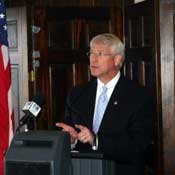Mississippi's two U.S. senators signed onto a pledge last week by fellow Republicans to refrain from requesting earmark funds for their home state during the upcoming 112th Congress. Sens. Thad Cochran and Roger Wicker--ranked as the No. 1 and No. 3 "earmark kings" in the U.S. Senate--announced they would go along with the Senate Republican Conference's call to temporarily halt federal "pork-barrel" spending, which is the long-time practice of sending congressionally budgeted funds to specific local projects from highway construction in the Delta to Hurricane Katrina restoration projects. Pork accounts for about 1 percent of the federal budget.
"Banning earmarks now is an important first step demonstrating that we are serious about the debt and runaway spending," stated Wicker, who helped bring $368 million in pork home to Mississippi in fiscal-year 2010.
While some money is budgeted through a committee process (like a plan to use federal match funding to finance a feasibility study for flood control on the Pearl River), earmarks do not go through the Appropriations Committee process but instead gets assigned by a specific legislator's directive. Congress appropriates money for a general cause, but it is a senior legislator who says whether or not that specific cause should serve a particular project.
Cochran, the Senate Appropriations Committee's ranking Republican, gets considerable access to the $1.2 trillion in discretionary spending allowed in the federal budget. FOX News labeled Cochran the "king of pork" in April, based on Citizens Against Government Waste's "2010 Congressional Pig Book," which reported that Cochran helped 240 projects costing $490 million in earmarks for his state. Since fiscal-year 2008, CAGW found that Cochran "obtained" more than $2 billion in pork for the state and beyond..
Wicker said in his statement that Congress needs a "timeout" from earmarks: "I am committed to cutting spending and getting our fiscal house in order, and that means changing the way business is done in Washington."
Not surprisingly, state and city lobbyists say the senators' decisions to forego earmarks will hurt the state's competitive edge when it comes to pulling down federal dollars for projects.
"If the state of Mississippi does not compete for earmarks, then other states will get that money. It's as certain as the mathematic dominance of populated states in the House," said Stan Flint, a lobbyist with Southern Strategy Group. "That's why seniority is so important to small states, and that's why earmarks are so important to low-population states, because we don't often have the votes to compete with more populous states for federal revenue."
Tea party-backed Sen. Jim DeMint, R-S.C., pushed the idea of the moratorium to reduce government waste. Senate Republicans unanimously passed the non-binding moratorium by voice vote Nov. 16, although they could still continue the practice without suffering anything more than criticism. Two days later, Republican House members unanimously extended a voluntary earmark ban they adopted earlier this year.
Although earmarks have gained notoriety for funding seemingly pointless projects, Mayor Harvey Johnson Jr. says most of the money goes to legitimate projects, such as road construction and university development. Johnson said he and every other Mississippi mayor should be nervous about losing a potential influx of investment during a time when local sales revenues are steadily dropping.
"During these tough economic times, cities across our nation are being called upon to do much more with less," Johnson said. He said the earmark system provides funding for "vital infrastructure needs," including the city's water and sewer systems, and "crucially important" funding for technology and equipment for the city's police and fire departments.
"We view our federal requests for funding as imperative and would hope that Congress would make every effort to consider every request we put forward on the merits," Johnson said.
The Taxpayer for Common Sense's 2009 State by State Breakdown of Earmark Value showed that only California and Texas, which earned $568 million and $370 million, respectively, in earmarks in 2009, beat Mississippi'.
Cochran revealed uncertainty even as he heeded the Republican call: "I remain unconvinced that fiscal prudence is effectively advanced by ceding to the Obama administration our constitutional authority to determine federal expenditures, but an earmark moratorium is the will of the Republican Conference," Cochran said in a statement.
Flint said Cochran and Wicker's refusal to earmark money will not kill the process, or save significant money. "Earmarks will never, never, never be eliminated--never," Flint said. "It is not going to happen. That's political reality. They say this is all about saving money, but they'd save more money requiring better mileage on cars. This is money that has already been appropriated," Flint said.
"It won't save the federal treasury one dime, because all the money has been appropriated to be spent. It's all a matter of whether we get it or somebody else gets it, and somebody else will end up getting it."



Comments
Use the comment form below to begin a discussion about this content.
comments powered by Disqus